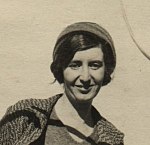Olga Tufnell
| Olga Tufnell | |
|---|---|

Tufnell c. 1958
|
|
| Born |
January 26, 1905 Sudbury, Suffolk, England |
| Died | April 11, 1985 (aged 80) London, England |
| Nationality | British |
| Fields | Archaeology |
| Institutions | Wellcome Foundation |
| Known for | Lachish excavations |
| Influences | Sir Flinders Petrie |
Olga Tufnell (26 January 1905 – 11 April 1985) was a British archaeologist who assisted on the excavation of the ancient city of Lachish in the 1930s. She had no formal training in archaeology, but had worked as a secretary for Flinders Petrie for a number of years before being given a field assignment. Olga then went on to join James Leslie Starkey in the expedition to find Lachish in 1929 and remained part of the team for the following seasons.
When Starkey was killed in 1938, the team finished the season then closed the site. Olga volunteered to write up the report of the dig and spent the following twenty years researching and writing up the majority of the excavation report. Olga's work has been regarded as the "pre-eminent source book for Palestinian archeology". Once the report was published, she turned her attention to cataloguing scarabs and other seals.
Olga Tufnell was born on 26 January 1905 in Sudbury, Suffolk to a prominent landholding family. Her father, Beauchamp Le Fevre Tufnell had been a second lieutenant in the 4th Battalion of Essex Regiment, and her mother, Blanche, maintained a broad range of cultural interests, as well as working with the Anglo-Czech Society. Olga was a middle child with two brothers, Joliffe Gilbert Tufnell and Lewis de Saumarez Tufnell. She spent her early life in Little Waltham, and was educated at schools in London and Belgium before going to finishing school in Italy.
When Olga had completed her time at the finishing school in 1922, she went to help her mother's close friend Hilda Petrie and her husband Sir Flinders Petrie, with an exhibition of their recent finds at University College London, before taking on a secretarial role at the British School of Archaeology in Egypt. She held the position of Hilda Petrie's secretary for five years, though she described it as "dull and repetitive work" in fundraising, but also spent some time drawing and repairing pottery. Olga's work evidently impressed Sir Flinders who, at the end of 1927, offered her an opportunity to assist him in the field in 1928.
...
Wikipedia
